Teaching

Resources
Video Lessons

Engineering Statistics
This is an introductory course in applied statistics and probability for undergraduate engineering students. At the end of the course, students are prepared with basic statistics knowledge and statistical thinking skill to execute the role as an engineer in proposing new model or refining existing product.
The course begins with an introduction to statistics in engineering and then the elementary probability theory and properties of probability distributions are covered. By completing these first few chapters, students are expected to recognize and solve problems related to probability distributions of events based on parameters being investigated.
Sampling is the basis of estimation, then an introduction to sampling distribution including point and interval parameters estimations of parameters together with the respective hypothesis testing are considered. These chapters provide the ability to students in selecting and justify the correct statistical inference methods in decision making that involved population parameters in engineering statistics problems.
The remaining chapters including one-way analysis of variance (ANOVA), Goodness-of-fit and independence tests as well as a simple linear regression are also taught in this course. Students will also be exposed to and trained in the use of computer software such as Microsoft Excel and SPSS to carry out a practical data analysis. Overall, students will know how to perform the suitable statistical analysis and procedures to produce meaningful interpretation of data.
The lecturer honestly is one of the great lecturers I have had so far. Well distributed planning of classes,quizzes, and tests. Always doing live classes to ensure we understood the teaching. Also, the lecturer was considerate to students.
Assalamualaikum Dr, kami berasa gembira dan bersyukur Dr dapat ajar kami dlm subject statistics kerana kami melihat Dr sangatlah semangat, gembira dan sangat positif dlm membantu kami, terimakasih Dr
Everything went great, Dr Adina is very nice and considerate person. Ready to help her students. Thankyou so much Dr 🙂
even Dr Adina was new in UTM, she always gives her best for their students. kudos to Dr Adina .execellent. hope we will meet again next sem.
Amazing lecturer! Knowledgeable, caring and laid-back. Truly enjoy the topics covered. Love the compact notes provided by Ms Adina.
Overall is good. There is two-way interaction and understandable working example. Brilliant!
Engineering Mathematics
Engineering Mathematics I includes topics in basic calculus and algebra. The focus is on differentiation and integration of functions involving inverse trigonometric functions, hyperbolic and inverse hyperbolic functions; improper integrals; series; vectors including line and plane equation; matrices including vector spaces, eigenvalues and eigenvectors; polar coordinates; and complex numbers including de Moivre’s theorem.
An orderly and structured way of delivering lessons. The voice used is clear and bright in order and easy to understand.
Dr Adina really kind to her students and clearly explains every parts of the calculation clearly and always help students who did not understand on some of the chapter..thank you Dr for your kindness <33
Dr Adina Najwa is very kind to me in this semester. She tries to break it down so that you
understand everything. Dr Adina Najwa is easy to communicate and very helpful.
The lecturer is nice and caring toward students. I love the class and I wish to be in her class more. The lecturer always prepares before the class begins and she is a kind-hearted person.
Design of Experiment
The aim of this course is to develop skills and relevant theories to a range of traditional statistical techniques for designing and analysing scientific experiments. An extension to model multiple variables is also introduced. The focus is on understanding the underlying design and model to answer scientific research question by planning appropriate design, seeking scientific information by communicating with scientist, interpreting output, and presenting results. The statistical design covers Completely Randomised Design and Blocking, Factorial Design, and Fractional Design, and statistical model covers Multiple Linear Regression. Examples and assignments involve computing in R/Microsoft
Excel or SPSS softwares. The prerequisite for this course is SSCM 1103 and the software.